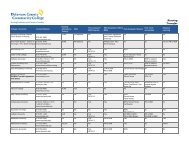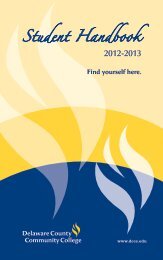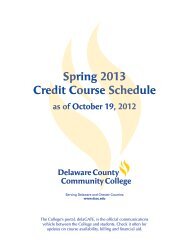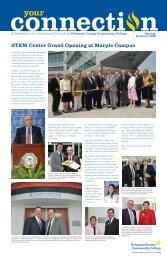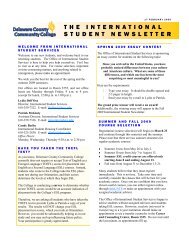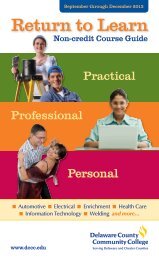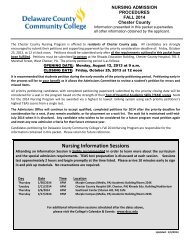2010 Catalog - Delaware County Community College
2010 Catalog - Delaware County Community College
2010 Catalog - Delaware County Community College
Create successful ePaper yourself
Turn your PDF publications into a flip-book with our unique Google optimized e-Paper software.
COURSE DESCRIPTIONS 153<br />
Upon successful completion of this course, students<br />
should be able to:<br />
• Explain the nature of psychology and describe the<br />
methods used by psychologists to study behavior.<br />
• Identify the major physiological structures involved<br />
in the study of behavior.<br />
• Identify the principles of sensation and perception<br />
describing illustrative phenomena.<br />
• Describe current theories of learning and thinking<br />
explaining their influence in education, life-span<br />
development and other life situations.<br />
• Describe the major trends in explaining human<br />
emotion and motivation and how they are assessed.<br />
• Identify the major theories of human personality<br />
and development.<br />
• Evaluate the impact of major trends in analyzing<br />
ourselves, interpersonal and social relationships,<br />
and the origins, classification and treatment of<br />
mental disorders.<br />
• Explain the relationship among physiology, perception,<br />
learning, cognition, motivation and personality,<br />
applying them to understanding life situations.<br />
Prereq. ENG 050 and REA 050<br />
3 Credits 3 Weekly Lecture Hours<br />
PSY 200<br />
Personality Theories<br />
Emphasis in this course is on the understanding and<br />
application of basic concepts of psychodynamic, behavioral,<br />
cognitive and social cognitive, and humanistic-existential<br />
perspectives to personal and interpersonal functioning.<br />
Upon successful completion of the course, students<br />
should be able to:<br />
• Detail the characteristics of psychoanalytic theory.<br />
• List and describe the characteristics of behaviorist and<br />
social learning theories.<br />
• Describe the characteristics of humanistic psychology.<br />
• Identify the characteristics of cognitive theories of<br />
personality.<br />
• Explain how an eclectic blend of several major<br />
personality theories can be applied to common life<br />
situations and experiences.<br />
Prereq. PSY 140<br />
3 Credits 3 Weekly Lecture Hours<br />
PSY 202<br />
Theories of Counseling<br />
This course is a one-semester introduction to the basic<br />
theoretical approaches used in counseling. This course is<br />
designed to give students an overview of the different<br />
psychological theories used by counselors, therapists and<br />
human service professionals. A goal of the course is to<br />
allow students with an interest in human services to better<br />
understand the options open to both counselors and<br />
clients when engaging in the therapeutic process. While<br />
the curriculum will not make counselors of the students<br />
who complete this course, it will provide a foundation of<br />
knowledge about the major theories.<br />
Upon successful completion of this course students<br />
should be able to:<br />
• Describe relevant counseling theories<br />
• Understand various ethical issues in the practice<br />
of counseling<br />
• Describe the terminology associated with various theories<br />
• Identify the major contributors associated with<br />
various theories<br />
• Explain the assumptions of each theory<br />
• Identify the goals of each theory<br />
• Identify the roles of the therapist and the client within<br />
each theory<br />
• Explain the process of therapy for each theory<br />
• Identify the various techniques associated with<br />
each theory<br />
• Evaluate the strengths and limitations of each theory<br />
• Describe the characteristics of a multiculturally<br />
competent counselor<br />
Prereq. PSY 140, ENG 100<br />
3 Credits 3 Weekly Lecture Hours<br />
PSY 203<br />
Counseling Skills<br />
This experiential course is a one-semester introduction to<br />
the basic skills used in interviewing and counseling adults.<br />
Designed for individuals pursuing a career in human<br />
services, the focus is on developing the core skills<br />
necessary to facilitate effective helping relationships. This<br />
course includes both didactic instruction and the<br />
development of basic techniques through applied<br />
counseling lab activities.<br />
Upon successful completion of this course, students<br />
should be able:<br />
• Evaluate the differences and similarities among<br />
interviewing, counseling and psychotherapy.<br />
• Explain the characteristics of a multiculturally<br />
competent counselor.<br />
• Describe core ethical principles in interviewing<br />
and counseling.<br />
• Identify the elements of an informed consent form.<br />
• Demonstrate effective verbal and nonverbal attending<br />
behavior.<br />
• Evaluate the effectiveness of open and closed questions.<br />
• Demonstrate the foundational active listening skills of<br />
encouraging, paraphrasing, and summarizing.<br />
• Demonstrate reflection of feelings skills.<br />
• Demonstrate basic confrontation and challenging skills.<br />
• Demonstrate reflection of meaning skills.<br />
• Explain the concept of immediacy in a counseling<br />
relationship.<br />
• Evaluate the influencing skills of self-disclosure<br />
and feedback.<br />
• Describe the goal setting and action stages<br />
of counseling.<br />
• Explain how basic counseling skills and concepts fit with<br />
various theoretical models of psychotherapy.<br />
• Describe the importance of advocacy, community<br />
awareness and social change in counseling.<br />
• Conduct an interview using only listening skills.<br />
Suggested co-requisite - Theories of Counseling (PSY<br />
202)<br />
Prereq. PSY 140, ENG 100<br />
3 Credits 3 Weekly Lecture Hours<br />
PSY 204<br />
Foundations of Addictions<br />
The main goal of this course is for students to develop<br />
knowledge of the nature and complexity of addiction.<br />
Emphasis in this course is developing and understanding<br />
of the addiction process utilizing a biopsychosocial<br />
perspective. The roles of trauma family dynamics, and<br />
biological predisposition will be explored. Topics examined<br />
include, but are not limited to, addictions to substances,<br />
gambling, shopping, eating, internet use, and sex.<br />
Treatment options will be discussed.<br />
Upon successful completion of this course, students<br />
should be able to:<br />
• Demonstrate an understanding of theoretical<br />
foundations of addiction.<br />
• Describe societal issues associated with<br />
addictions/dependency.<br />
• Understand the contribution of psychological<br />
perspectives to addiction.<br />
• Explain the techniques involved in treatment of addiction.<br />
• Identify programs that provide prevention services as<br />
well as those which provide rehabilitation programs<br />
and support services.<br />
• Develop a working knowledge of 12-Step Programs<br />
and their benefits to addicted persons and their<br />
families/friends.<br />
• Realize the consequences of addiction on family<br />
members and friends (Co-dependency, enabling,<br />
interventions)<br />
• Understand the relationship between HIV/AIDS and<br />
Substance Abuse.<br />
• Define the term Dual-Diagnosed and provide examples<br />
demonstrating this.<br />
• Identify Legal and Ethical Standards involved in<br />
working with substance abuse clients.<br />
• Explain the methods of drug testing and its<br />
impact on society.<br />
• Describe the similarities and differences involving<br />
addictions to legal substances (tobacco, alcohol, food,<br />
prescribed medications) vs. illegal substances (cocaine,<br />
marijuana, heroin).<br />
• Define populations where addictions are highly<br />
prevalent and determine risk factors which may be<br />
contributing to this.<br />
Prereq. PSY 140 or SOC 110 or HUS 101<br />
3 Credits 3 Weekly Lecture Hours<br />
PSY 205<br />
Human Sexual Behavior<br />
Utilizing a biopsychosocial model, this course seeks to<br />
foster healthy attitudes toward sexuality by providing<br />
knowledge and having discussions about the formation of<br />
sexual beliefs and myths, the anatomy and physiology of<br />
human sexual systems, the physiological and social aspects<br />
of sex and gender roles, love and sexuality, sexual minorities,<br />
and the legal aspects of sexuality. (Note: material of a<br />
sensitive nature will be discussed in this course).<br />
Upon successful completion of this course, students<br />
should be able:<br />
• Discuss human sexuality from historical and multicultural<br />
perspectives.<br />
• Define major theoretical perspectives that influence the<br />
scientific study of human sexuality.<br />
• Describe human sexual anatomy and physiology, arousal<br />
and response, conception and contraception, sexually<br />
transmitted diseases, and varieties of sexual life styles,<br />
relationships, and practices.<br />
• Engage in discourse on gender as it relates to sexuality<br />
and society.<br />
• Recognize paraphilias and the changing nature of social<br />
acceptance for abnormal behaviors.<br />
Prereq. PSY 140 or SOC 110<br />
3 Credits 3 Weekly Lecture Hours<br />
PSY 210 Lifespan Human Development<br />
This course is a one-semester elective in which the<br />
major processes of human development from birth to<br />
death are described and explained.<br />
Upon successful completion of this course, students<br />
should be able to:<br />
• Identify and evaluate the basic universal principles<br />
underlying human development.<br />
• Identify and describe the major physical and<br />
psychological characteristics of prenatal development,<br />
infancy, childhood, adolescence, maturity and aging.<br />
• Describe, evaluate and compare the various theoretical<br />
approaches to cognitive, emotional, language, personality<br />
and social development throughout the life span.<br />
Prereq. PSY 140<br />
3 Credits 3 Weekly Lecture Hours<br />
PSY 215<br />
Industrial Psychology<br />
The study of organizations and groups from a psychological<br />
perspective. The course covers fundamentals of<br />
organizational behavior, motivation and reward systems,<br />
leadership and organizational change, rumor, resistance to<br />
change, management styles and stress as it applies to the<br />
workplace. It is designed to meet the special needs of<br />
business administration students, as well as business<br />
management and psychology majors. It will also prove of<br />
great value to anyone contemplating any supervisory or<br />
management position, such as in nursing, education,<br />
social work and construction technology.<br />
Upon successful completion of this course, students<br />
should be able to:<br />
• Define organizational behavior, list the key elements<br />
and understand why it is important to understand the<br />
psychological principles affecting the workplace.<br />
• Understand and explain a motivational theory that<br />
pertains to industrial and organizational psychology.




